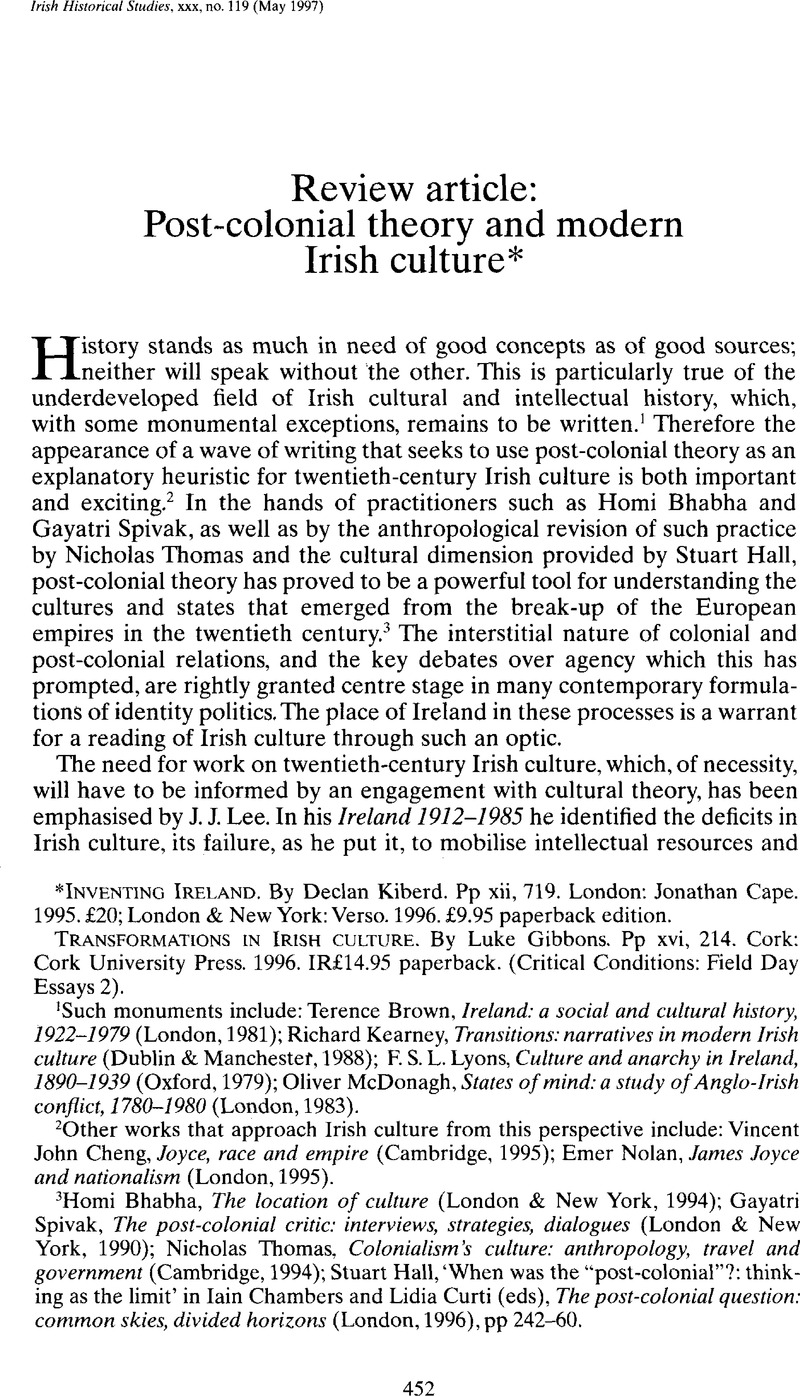Published online by Cambridge University Press: 28 July 2016

Inventing Ireland. By Declan Kiberd. Pp xii, 719. London: Jonathan Cape. 1995. £20; London & New York: Verso. 1996. £9.95 paperback edition.
Transformations in Irish culture. By Luke Gíbbons. Pp xvi, 214. Cork: Cork University Press. 1996. IR£14.95 paperback. (Critical Conditions: Field Day Essays 2).
1 Such monuments include: Brown, Terence, Ireland: a social and cultural history, 1922–1979 (London, 1981)Google Scholar; Kearney, Richard, Transitions: narratives in modern Irish culture (Dublin & Manchester, 1988)Google Scholar; Lyons, F.S.L., Culture and anarchy in Ireland, 1890–1939 (Oxford, 1979 Google Scholar); McDonagh, Oliver, States of mind: a study of Anglo-Irish conflict, 1780–1980 (London, 1983)Google Scholar.
2 Other works that approach Irish culture from this perspective include: Cheng, Vincent John, Joyce, race and empire (Cambridge, 1995)Google Scholar; Nolan, Emer, James Joyce and nationalism (London, 1995)CrossRefGoogle Scholar.
3 Bhabha, Homi, The location of culture (London & New York, 1994 Google Scholar); Spivak, Gayatri, The post-colonial critic: interviews, strategies, dialogues (London & New York, 1990)Google Scholar; Thomas, Nicholas, Colonialism’s culture: anthropology, travel and government (Cambridge, 1994)Google Scholar; Hall, Stuart, ‘When was the “post-colonial”?: thinking as the limit’ in Chambers, Iain and Curti, Lidia (eds), The post-colonial question: common skies, divided horizons (London, 1996), pp 242-60Google Scholar.
4 The thesis informs the text as a whole, but see in particular Lee, J.J., Ireland 1912–1985:politics and society (Cambridge, 1989), pp 562–643.Google Scholar
5 Anderson, Benedict, Imagined communities: reflections on the origin and spread of nationalism (London, 1991)Google Scholar; Gellner, Ernest, Nations and nationalism (Oxford, 1983 Google Scholar).
6 Smith, Anthony D., The ethnic origins of nations (Oxford, 1986 Google Scholar); idem, National identity (London>, 1991).
7 Kearney, Richard, The wake of imagination: ideas of creativity in Western culture (London, 1988 CrossRefGoogle Scholar).
8 For a discussion of the ubiquity of these issues from the fifteenth century on see Dunn, John (ed.), The economic limits to modern politics (Cambridge, 1990 CrossRefGoogle Scholar); idem (ed.), Contemporary crisis of the nation state? (Oxford, 1995).
9 Bartlett, Thomas, ‘An end to moral economy: the Irish militia disturbances of 1793’ in Past & Present, no. 99 (1983), pp 41-64Google Scholar; Whelan, Kevin, ‘An underground gentry?’ in The Tree of Liberty: radicalism, Catholicism and the construction of Irish identity, 1760–1830 (Cork, 1996), pp 3-56.Google Scholar
10 Viswanathan, Gauri, Masks of conquest: literary study and British rule in India (London, 1990 Google Scholar).
11 Curtin, Philip et al. (eds), African history: from earliest times to independence (London & New York, 1995; 1st ed., 1978), p. 483 Google Scholar.
12 The work on this aspect of European cultural history has concentrated on the early modern period. See Chartier, Roger, The culture of print: power and the uses of print in early modern Europe (London, 1989)CrossRefGoogle Scholar; Eisenstein, Elizabeth L., The printing press as an agent of change: communications and cultural transformation in early modern Europe (2 vols, Cambridge, 1979 Google Scholar); Goodman, Dena, The Republic of Letters: a cultural history of the French Enlightenment (Ithaca, N.Y., 1994 Google Scholar).
13 This argument was first developed in Habermas, Jürge, The structural transformation of the public sphere: an inquiry into a category of bourgeois society (London, 1989; 1st ed., 1961)Google Scholar.
14 Daly, Mary E. and Dickson, David, The origins of popular literacy in Ireland: language change and educational development, 1700–1920 (Dublin, 1990)Google Scholar.
15 Colley, Linda, Britons: forging the nation, 1707–1837 (New Haven, 1992)Google Scholar.
16 Thompson, E.P., ‘Which Britons?’ in Persons and polemics: historical essays (London, 1994), p. 326.Google Scholar
17 Bhabha, Homi (ed.), Nation and narration (London, 1994)Google Scholar; Ahmad, Aijaz, In theory: classes, nations, literatures (London & New York, 1992 Google Scholar).
18 Bhabha, Homi, ‘Difference, discrimination and the discourse of colonialism’ in Barker, Francis et al. (eds), The politics of theory (Colchester, 1983), p. 199 Google Scholar; Ahmad, In theory, esp. pp 159–220; Dennis Porter, ‘Orientalism and its problems’ in Barker et al. (eds), op. cit., pp 173–93. See also Said, Edward, Orientalism: Western conceptions of the Orient (London, 1978)Google Scholar; idem, Culture and imperialism (London, 1993).
19 Ellis, G. (ed.), Writing Irish history: revisionism, colonialism and the British Isles in Irish Review xix (spring/summer 1996), pp 1-21 Google Scholar.